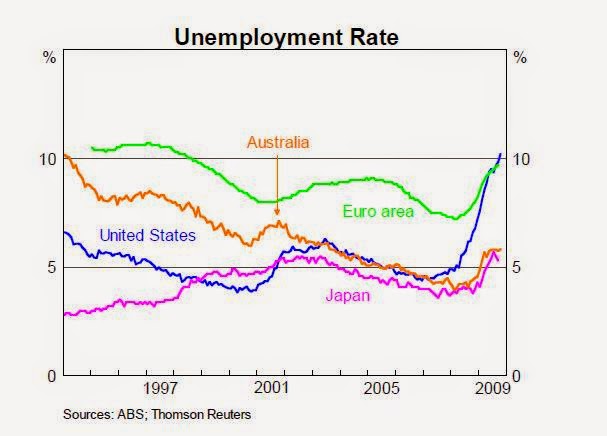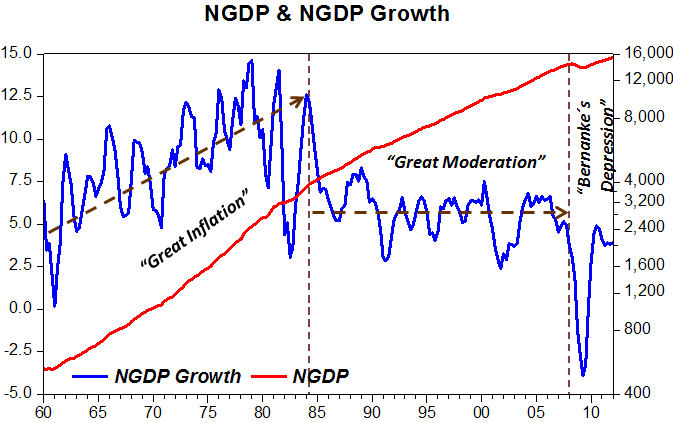The central purpose of Calomiris & Haber's
Fragile by Design: the Political Origins of Banking Crises is to explain to Americans why their banking system does not perform as well as other countries--particularly compared to that of their neighbour, Canada. In chapter 14, the authors put the matter quite starkly:
... if a highly stable banking system is defined as one that has been crisis-free since 1970, then only six out of 117 countries--Australia, Canada, Hong Kong, Malta, New Zealand, and Singapore--meet the threshold for being both credit abundant and crisis free.
As the authors note, all six were part of the British Empire. Three (Hong Kong, Malta and Singapore) are city-states. The other three (Australia, Canada and New Zealand) are among the world's most stable and long-lived democracies. The authors argue that these latter three countries also have something else in common:
... the structures and political histories of these three countries tended to mitigate the ability of populists and bankers to form coalitions that disadvantage everyone else.
Something that is very clear, is that "de-regulation" is a term empty of explanatory power. All successful six have liberalised financial markets--Australia and New Zealand, for example, were leaders in financial "de-regulation". If someone starts trying to blame the
Global Financial Crisis (GFC) on "de-regulation", you can stop reading, they have nothing useful to say.
It is very much the point of Calomiris & Haber's
Fragile by Design to look at these issues comparatively and historically, which gets in the way of all sorts of congenial ideological narratives. Their final chapter (Chapter 15) is entitled "Reality is a Plague on Many Houses" just to make that point--particularly that Americans need to look outside their own history for answers.
Playing the game
In Chapter 2,
The Game of Bank Bargains, they make it quite explicit that the question is always the
actual structure of financial regulation:
... the normal functioning of banks depends on three sets of property rights that only government can provide. Banks need powerful governments. But power may not be wielded in the interests of bankers unless bankers can convince the group in control of the government to partner with them.
Hence the game of bank bargains. Hence also the
political origins of banking crises. Or, as they say:
... our goal is to explore why banking is all about politics--and always has been.
It is inherent in the nature of banking given that:
Any enterprise whose inputs and outputs consist primarily of promises to repay debts is inherently unstable and risky.
Banks have to deal with
credit risk and
liquidity risk. Hence banks are pioneers of limited liability laws:
... in the vast majority of countries, the first enterprises to seek charters granting their shareholders a limit on liability were banks: the special limited-liability acts for banks typically antedated general incorporation laws by decades.
Which brings the government into the heart of banking.
A bank cannot simply declare that its shareholders have limited liability or other legal protections. Only the government can offer these. It does so by granting privileges--through bank charters--and enforcing them in courts. A charter is not just a license; it is a contract between the bank and the government.
To have an effective bank bargain, (1) bank assets have to be protected from government expropriation, (2) minority shareholders and depositors have to be able to stop bank insiders expropriating their assets or else be compensated for accepting the risk of expropriation by bank insiders, and (3) there has to be mechanisms to protect bank insiders, minority shareholders and depositors from expropriation by borrowers or else be compensated for accepting the risk of expropriation by borrowers.

Since 1970, six jurisdictions have managed to do all that. Why so few jurisdictions? Because governments face conflicts of interest in managing the game of bank bargains. They regulate banks, but borrow from them. They discipline debtors, but often rely on them for political support. They allocates losses among creditors in cases of bank failures, but may simultaneously look to them for political support. The constant temptation is to shift the game of bank bargains to benefit those who usefully notice at the cost of those who do not; the
arsonists in charge of the fire brigade problem, with government having, as Calomiris & Haber put it "multiple opportunities to behave opportunistically".
Most governments fail this test. Hence only 6 out of 117 jurisdictions managing the game of bank bargains so as to provide abundant credit but avoiding bank crises.
If the standard is set so as to include countries that have avoided a crisis since 1970, but are only required to have a level of credit to GDP equal to the
mean across all countries, we get all the way to 13 jurisdictions out of 117: the "successful six" are joined by the Bahamas, Bahrain, Barbados, Belize, Macao, Mauritius and South Africa. All are former parts of the British Empire, except Macao, and all achieved independence peacefully.
Out of the 13, all but 3 are small islands or city-states. While, like Australia and New Zealand, South Africa (since the 1997 constitution was a brokered deal with the white minority) has institutions which:
... make it hard to populist movements to form coalitions with banks to enact regulatory policies that benefit them at the expense of everyone else.
The US, by contrast, not so much.
Small islands and city-states dominate the list of the successful players of the game of bank bargains because they are simply much more likely to have broadly-based bargains. (Though Iceland
is a salutary reminder that success is not
guaranteed from being small.)
As for the worst performers, setting the criteria as having at least two bank crises since 1970 and credit to GDP ratio at or below average gives us: Chad, the Democratic Republic of Congo, Argentina, Bolivia, Brazil, Cameroon, the Central African Republic, Colombia, Costa Rica, Ecuador, Kenya, Mexico, Nigeria, the Philippines, Turkey and Uruguay. (Kenya is clearly letting the British-is-better side down, though its path to independence was
marred by violence.
[Nigeria is also letting the British-is-better side down, but it is basically a mistake as a single country.]) Basically, as the authors point out, autocracies, new democracies or democracies whose institutions provide few barriers to
rent-seeking.
Broadening the question
When we look at lists of
per capita GDP on a
purchasing price parity (PPP) basis, we can see that the US is the only large country in the top 10 persistently included: the others being small (less than 10 million in population) as well as oil-rich, monarchical or democratic (or some combination thereof--looking at you Norway). So, clearly the US continues to do
something right.
Of course, since the US is seriously a federation, it could be argued it is really a bunch of small countries operating in close formation. That what is by far the
largest state by population (California) is also something of a public-policy mess adds plausibility to the claim. As does the only two countries with populations of over 10 million to get into any of the lists being Canada and Australia (also federations).
Clearly, the trick is to have
responsive states. With smaller being generally better, as information flows more easily and more inclusively. It is generally just harder to stick it to folks (either by what you do or what you don't do) in a way that doesn't get noticed in smaller jurisdictions. (Unless jurisdictions are so small they fly under the media radar but are big enough to be semi-anonymous--urban local government in Oz has a bit of a problem there.)
There is an important caveat though, which Calomiris & Haber identify in discussing why Canada's "bank bargain" has consistently worked so much better than the US's--forcing policy bargaining to be at a broad level is less likely to generate nasty externalities. The Canadian "game of bank bargains" was played at a national level in a parliamentary-and-imperial system, so created a stable, interests-encompassing bargain more sensitive to long-term consequences.

The US "game of bank bargains" was played at State and Federal levels in coalitions built by adding individual constituencies together in congressional systems, creating unstable, interests-excluding bargains less sensitive to long-term consequences. (Since banking is all about risks across time, long term consequences are a particular problem for bank bargains.) But that is not actually an argument for bigger-being-better (Canada was always a much less populous jurisdiction than the US). It is an argument for more broadly-based being better. And broader is easier if smaller.
Still, that politicians are going to be looking to craft useful (to them)
externalities means we can only expect politicians to deal with awkwardly visible negative externalities, not be a general solution to the problem of externalities. And we should also be sceptical of public policy mechanisms well set up to generate politically useful externalities. My nominations:
Public ownership.
Bureaucratic approval systems. (Unconstitutional in Germany, and good on them--they get their reward in much more rational housing markets.)
Complex tax rules.
Low visibility regulations. (Which would be most of them.)
[Cross-posted
at Skepticlawyer.]






-line-1fromStart.png)
















.svg.png)
.svg.png)

.svg.png)
.svg.png)

.png)
.svg.png)




